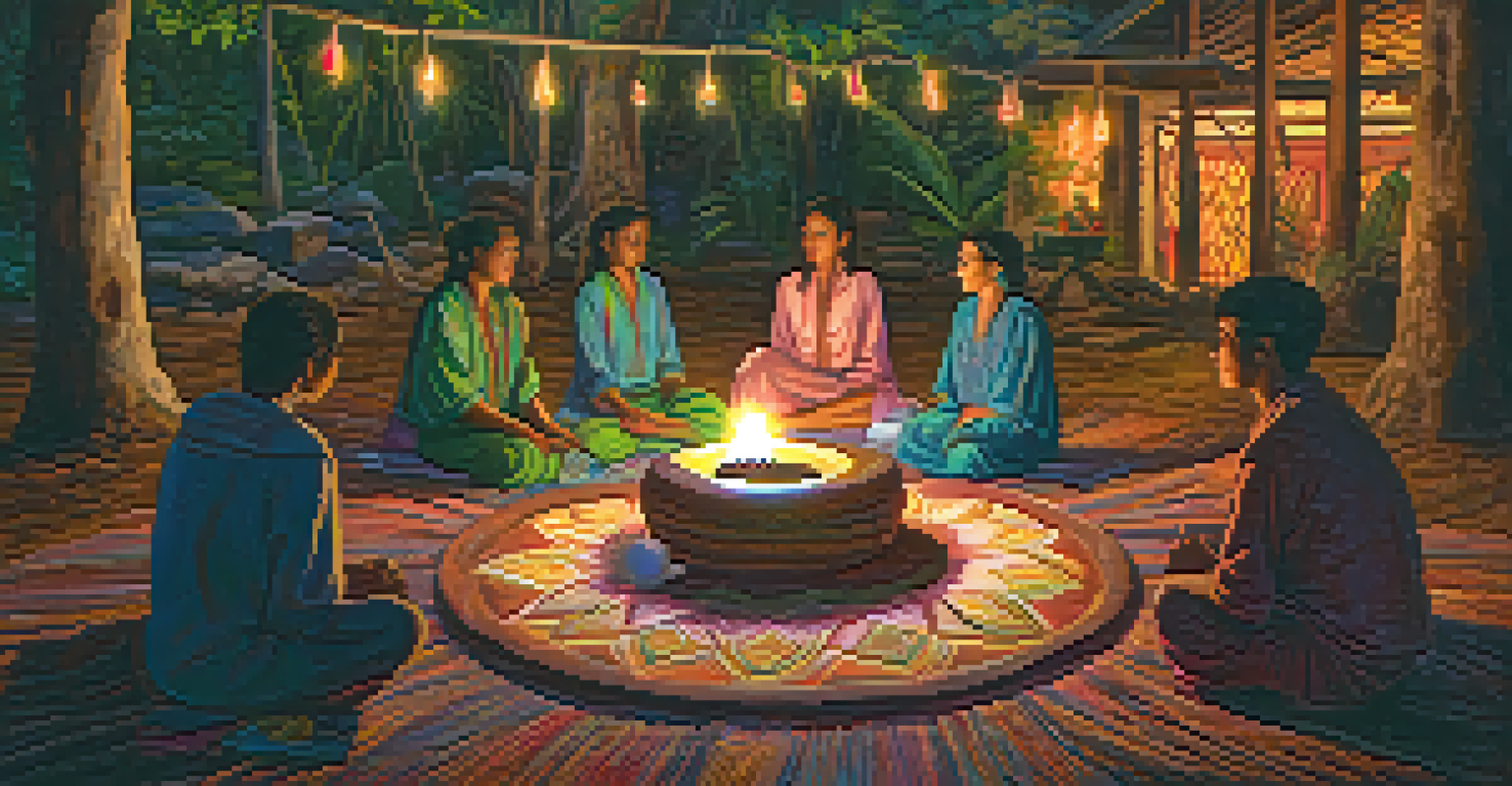Exploring Ayahuasca's Impact on Mental Health Recovery

Understanding Ayahuasca and Its Cultural Roots
Ayahuasca is a traditional plant medicine originating from the Amazon rainforest, used for centuries by indigenous tribes for spiritual and healing purposes. This brew, made from the Banisteriopsis caapi vine and the Psychotria viridis leaf, has gained popularity beyond its native regions, attracting interest from those seeking mental health support. Its use in ceremonies often involves guided experiences aimed at personal insight and emotional healing.
The experience often brings buried emotions to the surface, allowing participants to confront and work through painful memories.
The ceremonial context is crucial; participants often partake in guided sessions led by experienced shamans who facilitate the experience. This structure helps create a safe environment for emotional exploration and healing. The communal aspect of these ceremonies also fosters a sense of belonging, which can be particularly beneficial for individuals feeling isolated in their struggles.
The increasing interest in Ayahuasca has sparked discussions about its potential therapeutic benefits, especially for mental health conditions like depression, anxiety, and PTSD. Understanding its cultural significance helps frame its use in modern therapeutic contexts, highlighting the importance of respect for its origins.
The Science Behind Ayahuasca and Mental Health
Research into Ayahuasca's effects on mental health is still in its early stages, but initial studies show promising results. Compounds in Ayahuasca, such as DMT (dimethyltryptamine), interact with serotonin receptors in the brain, which may help alleviate symptoms of depression and anxiety. This interaction can lead to profound emotional experiences and insights that many find therapeutic.

Some studies have reported significant reductions in depressive symptoms following Ayahuasca sessions, suggesting that it may help reset neural pathways associated with mood regulation. Moreover, participants often report lasting changes in their outlook on life, indicating that the insights gained during these experiences can facilitate long-term healing.
Ayahuasca's Cultural Significance
Understanding Ayahuasca's origins and the ceremonial context is essential for appreciating its therapeutic potential.
However, it's important to approach the research with caution. While the anecdotal evidence is compelling, more rigorous scientific studies are necessary to fully understand Ayahuasca's efficacy and safety in mental health treatment. This includes exploring potential risks and contraindications, ensuring that individuals are well-informed before considering this path.
Ayahuasca's Role in Healing Trauma
Many individuals seeking Ayahuasca therapy are drawn to its potential for processing trauma. The experience often brings buried emotions to the surface, allowing participants to confront and work through painful memories. This cathartic release can be a pivotal step in the healing journey, offering a new perspective on past experiences.
Integration refers to the process of incorporating the insights and experiences gained during an Ayahuasca ceremony into everyday life.
Through guided introspection, individuals frequently report gaining clarity about their trauma, which can lead to acceptance and emotional release. This is particularly beneficial for those struggling with PTSD, as Ayahuasca may help reframe traumatic memories and reduce their emotional charge. The unique combination of introspection and group support creates a powerful healing environment.
While Ayahuasca may not be a cure-all, its potential to catalyze healing processes is significant. As participants navigate their inner landscapes, they often find strength and resilience, empowering them to move forward in their recovery journey with a renewed sense of hope.
Navigating the Risks of Ayahuasca Use
Despite its potential benefits, Ayahuasca is not without risks. The intense psychological experiences can be overwhelming, especially for those with pre-existing mental health conditions. It’s crucial for individuals to undergo thorough screening and preparation before participating in Ayahuasca ceremonies to determine if it's suitable for them.
Physical side effects, such as nausea and vomiting, are common during Ayahuasca ceremonies. While many view this as part of the purging process, it can be distressing for some. Participants should be aware of these potential effects and choose a reputable retreat that prioritizes safety and well-being.
Potential Mental Health Benefits
Research indicates that Ayahuasca may alleviate symptoms of depression and anxiety through profound emotional insights.
Additionally, the legal status of Ayahuasca varies by country, and individuals should be informed about the regulations in their area. Engaging with a qualified healthcare provider before considering Ayahuasca as a treatment option ensures a safe and informed approach to mental health recovery.
The Importance of Integration After Ayahuasca Experiences
Integration refers to the process of incorporating the insights and experiences gained during an Ayahuasca ceremony into everyday life. This step is crucial as it helps individuals make sense of their experiences and apply the lessons learned to their personal growth. Without proper integration, the profound insights can fade, leaving individuals feeling lost or confused.
Many participants benefit from working with integration coaches or therapists who specialize in processing Ayahuasca experiences. These professionals provide support and guidance, helping individuals navigate their emotions and implement positive changes based on their insights. Integration can also involve journaling, meditation, or discussing the experience with supportive friends and family.
Ultimately, the integration phase is where the real healing takes place. By actively engaging with the insights gained during Ayahuasca ceremonies, individuals can foster lasting change and cultivate a healthier mindset, enhancing their overall mental health recovery.
Personal Stories: Transformative Ayahuasca Journeys
Many individuals have shared transformative stories about their Ayahuasca experiences. For instance, someone struggling with severe depression might find that a single ceremony helps them confront their feelings of worthlessness, leading to a newfound sense of purpose. These personal narratives highlight the profound impact Ayahuasca can have on mental health recovery.
One person recounted how Ayahuasca allowed them to revisit a traumatic childhood experience, which they had repressed for years. Through the ceremony, they were able to process and release the emotions associated with that memory, ultimately leading to a sense of liberation and healing. Such stories resonate with those seeking hope in their own mental health journeys.
Importance of Integration
Proper integration of Ayahuasca experiences is crucial for applying insights to everyday life and fostering lasting change.
These accounts serve not only as inspiration but also as a reminder of the unique nature of each individual's journey with Ayahuasca. While some find immediate relief, others may require multiple sessions and ongoing integration work to fully realize the benefits. It's a deeply personal path that can vary significantly from one person to another.
Conclusion: Is Ayahuasca Right for You?
As interest in Ayahuasca grows, many people wonder if it could be a beneficial option for their mental health recovery. While the potential for healing is significant, it's essential to approach this journey with careful consideration and preparation. Understanding both the benefits and risks will empower individuals to make informed decisions about their mental health.
Engaging with qualified professionals, whether in a therapeutic context or through reputable Ayahuasca retreats, is crucial. They can help guide individuals through their experiences, ensuring safety and maximizing the potential for healing. It's also important to have a solid aftercare plan in place for integration to fully benefit from the insights gained during ceremonies.

In the end, the decision to explore Ayahuasca should come from a place of curiosity and respect for its cultural roots. By taking the time to research and reflect, individuals can determine if this unique path aligns with their healing journey.